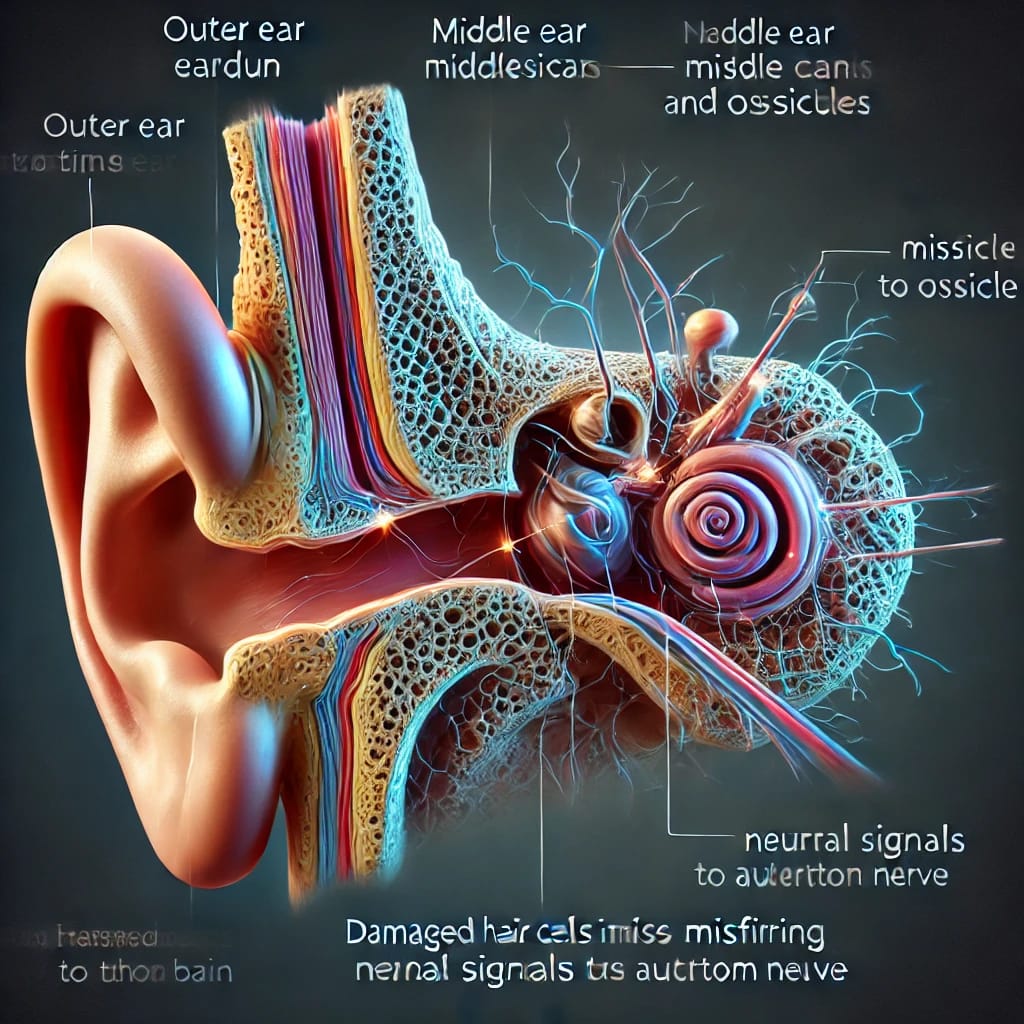Tinnitus
Tinnitus is the perception of ringing, buzzing, hissing, or other sounds in the ears without an external source. It can be temporary or chronic and varies in intensity. Common causes include exposure to loud noise, ear infections, age-related hearing loss, or underlying health conditions. Stress and anxiety can worsen symptoms. While there is no universal cure, treatments like sound therapy, cognitive behavioral therapy (CBT), and lifestyle changes can help manage it. Many people find relief through mindfulness, relaxation techniques, and avoiding triggers like caffeine and loud environments. Support groups and professional guidance can also improve quality of life.
You are not alone
Living with tinnitus can feel isolating, but you are not alone. Millions of people worldwide experience ringing, buzzing, or hissing sounds in their ears. Whether your tinnitus is mild or severe, managing it can be challenging—but there is hope.

Tinnitus occurs when the auditory system perceives sound without an external source. Here’s a breakdown of how the ear functions and how tinnitus develops:
1. Normal Hearing Process
Outer Ear (Pinna & Ear Canal): Captures sound waves and directs them toward the eardrum.
Middle Ear (Eardrum & Ossicles): Vibrations from the eardrum are amplified by the three small bones (malleus, incus, and stapes).
Inner Ear (Cochlea & Hair Cells): The cochlea contains thousands of tiny hair cells that convert these vibrations into electrical signals.
Auditory Nerve & Brain: Signals are sent to the brain, where they are interpreted as sound.
2.How Tinnitus Occurs
Damage to Hair Cells: Exposure to loud noise, aging, infections, or other factors can damage hair cells inside the cochlea.
Misfiring Signals: When hair cells are damaged, they can send random electrical impulses to the brain, even when no actual sound exists.
Phantom Sound Perception: The brain interprets these signals as sound, causing a constant ringing, buzzing, or hissing noise.
3. Factors That Worsen Tinnitus
Loud Noise Exposure: Can further damage hair cells.
Stress & Anxiety: Increase brain hyperactivity, making tinnitus more noticeable.
Ear Infections or Blockages: Can alter ear pressure, worsening symptoms.
Neurological Issues: Sometimes, nerve damage or conditions like Meniere’s disease can contribute.
.
Tinnitus Matcher – Find Your Tinnitus Tone
If you experience tinnitus, this tool can help you match the pitch and tone of your tinnitus. Follow these steps for the most accurate results
🛠️ Step 1: Prepare Your Environment
✅ Use headphones or earphones for precise sound matching.
✅ Sit in a quiet place to focus on the sounds clearly.
✅ Set your device’s volume to a low level before starting.
🎚️ Step 2: Adjust the Frequency
✅ Click the “Play Sound ” button. When You Changed Frequency Press “Play Sound ” Button again.
✅ Move the frequency slider left or right to find the closest match to your tinnitus sound.
✅ If unsure, try adjusting gradually until the tone sounds similar to what you hear.
🔊 Step 3: Adjust the Volume
✅ Once you’ve matched the frequency, slowly increase or decrease the volume to match your tinnitus level.
✅ Be careful! Avoid setting the volume too high, as loud sounds can be harmful.
💾 Step 4: Save or Record Your Match
✅ Note down your matched frequency and volume settings.
✅ If available, save your results for future reference or share them with a healthcare professional.
❗ Important Tips
🔹 Don’t stress if you can’t find a perfect match—tinnitus varies from person to person.
🔹 If you experience discomfort, stop immediately and lower the volume.
🔹 This tool is not a medical diagnosis—consult a specialist if needed.
